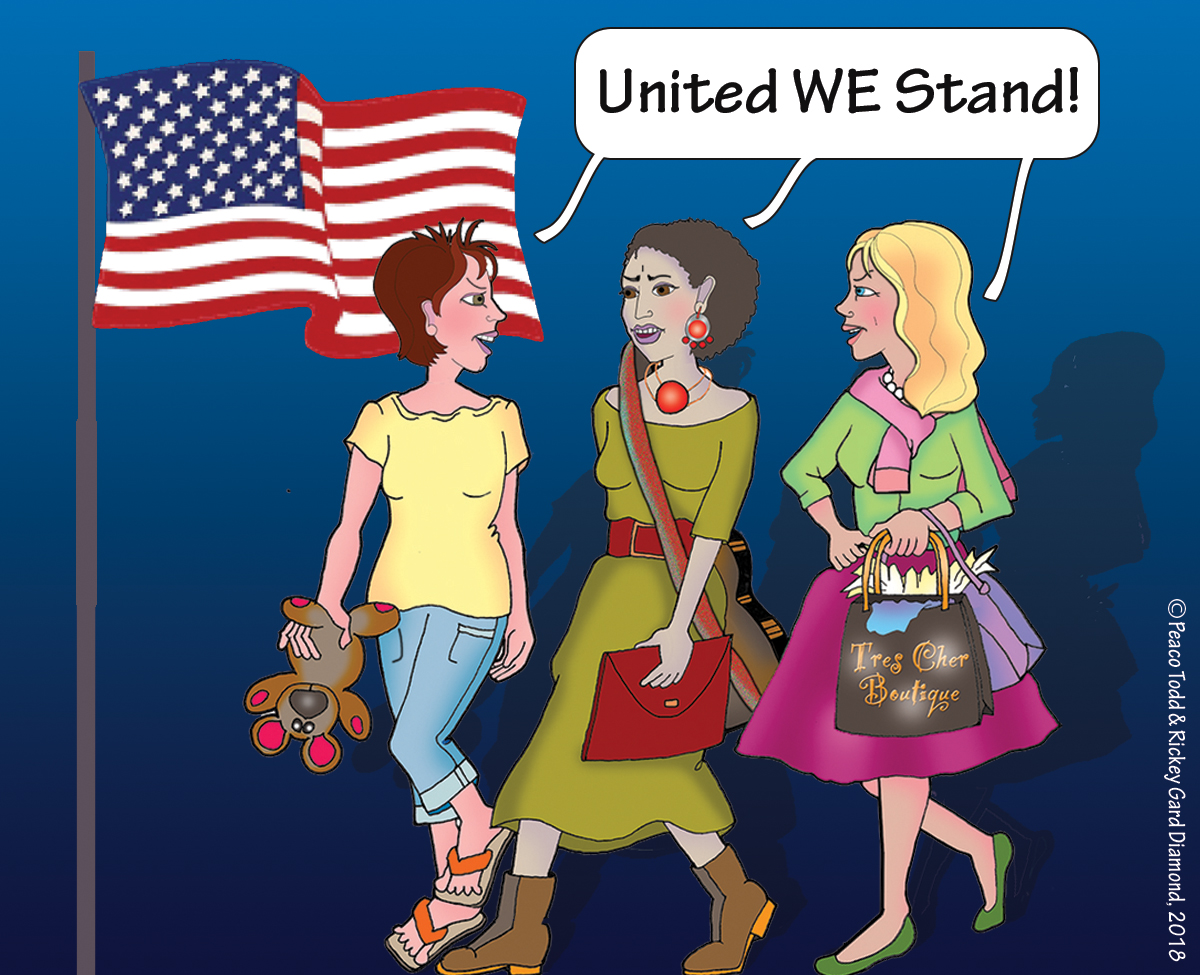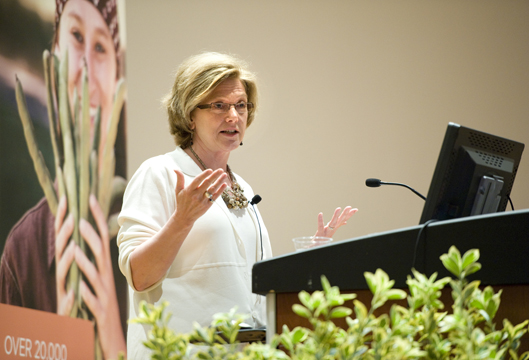E Pluribus Unum
Home of the Brave and the Free
I admit, the young piping voice of that little girl in the borderlands of Texas asking for her aunt to come get her, while another desolate child cried for his Papi, broke my heart. I felt grateful when Rachel Maddow broke down while reading an Orwellian euphemism, a new alien phrase, “tender age shelters.” What was being done in our name, with our tax dollars, by our government?
Today my head feels clearer, my heart braver, because so many Americans felt the same, and said, no, this isn’t who we are. What great news of that practical couple, who proposed raising bail money on Facebook for parents, so separation wouldn’t happen. Hoping for $15,000, they now have $13 million in donations to help local agencies that will work to reunite families.
It’s money needed, since our federal government has no system in place to do so, and remains silent on the matter. There is much talk about long sought-after immigration reform in Congress, but no mention of public hearings or a full airing of problems legislators only call “complex,” but seldom take time to explain. Republicans control matters, but even they can’t agree, the real reason we’re stuck.
If like me you’re weary, and becoming aware of how little you understand about legalities that ensnare people who seek safety and a future for their children, there’s help. These books go to places our legislators refuse to brave, busy waging war. These books freely wage life. Check them out!
Sonia Nazario’s recently updated, Enrique’s Journey: The Tale of a Boy’s Dangerous Odyssey to Reunite with His Mother. It highlights the stakes, the personal risks, and also the people who help.
Shanti Hekaran’s novel, Lucky Boy, reveals an undocumented immigrant mother’s journey, her detention and separation from her child, Ignacio, and another more privileged immigrant couple trying to adopt him. Honest—with comedy relief.
C. Susan Nunn’s vibrant novel, Song of the Earth, is the passionate tale of a newcomer journalist’s changing take on Arizona’s borderlands, its flash floods, its illegal immigrants, drug-runners, “coyotes,” and an ATF agent. An educational page-turner.
—Rickey Gard Diamond
Marjorie Kelly's Body Makeover
No, I’m not talking plastic surgery here, I’m talking about business leadership and its corpus. This Latin word literally means “body,” and Marjorie Kelly’s work has focused on that collective physique we have named “the corporation.” She first examined the history of laws that govern corporate norms in her book, The Divine Right of Capital. She uncovered corporate law’s deep roots in royalist thinking. One of my most admired journalists, William Greider, wrote the foreward.
She followed that up with what I am calling her body makeover. She calls for wider democratic ownership of business organizations in her book Owning Our Future. What she calls “generative” corporations would share work and production’s profits more cooperatively. She contrasts this new kind of endeavor with the old model of “extractive” corporations that exploit natural resources and cheap labor to produce maximum profit for its wealthy shareholders alone.
Part of a “new economy” group called The Democracy Collaborative, Kelly and her latest goal is to inspire a movement of 50 million corporate worker-owners by 2050. A wonderful writer, her latest work can get wonky, so I’ll link you here to one of her earliest questions: Can Corporations Be Good? published in Yes! Magazine back in 2012.
Yes! Magazine is full of unscrewed news and positive vibes. Its publisher, Fran Korten, wrote about Kelly’s history and her latest goal for worker-ownership more recently in TruthOut. These two articles will introduce you to Kelly’s innovations, and also to two cutting-edge publications, if you don’t already know them. You can connect with her Fifty By Fifty Network at https://www.fiftybyfifty.org
Despite her use of the g-word, generative, which literally requires diverse chromosomal exchanges between two sexes, Kelly seems reluctant to mention gender in her work. I can’t say I blame her, as that generally doesn’t help you get ahead. But gender is an element I consider crucial to understanding the meaning of “female” in a still male-dominated world of business and money—and crucial for both men and women to understand if we’re to make lasting corpus/corporate changes.
—Rickey Gard Diamond
A Tax You Can Love
This New World, edited by Laura Paddison, is a new subset of HuffPo for those interested in sustainable business models. They say capitalism is broken. Can we fix it?
Here's one idea Paddington recently wrote about that has gotten an airing in other capitalist countries: Introduce a tax on robots that replace workers. Workers who earned wages were taxed on those wages. But now that income stream has dwindled, impoverishing workers and governments. Under the guise of "progress," corporations are given tax advantages for "modernizing," and ultimately robots underbid even the poorest-paid human.
That's profitable for corporations. But is it profitable for human beings and civilization? No one has yet passed a tax on robots, but South Korea came the closest, ending its corporate tax subsidy for "modernizing." There's no doubt but that machines will continue to replace humans, but a tax would help slow the process down, giving us time to retrain and problem-solve—like advocating for the caring work that machines cannot do, and raising caring wages to compensate for those lost ones.
Interested? Apparently Bill Gates likes the idea. Here's a link to Paddington's article: https://www.huffingtonpost.com/entry/robot-tax-bill-gates_us_5b0f030ce4b0be10a4882b63
Don't Miss CommonBound, Even If You Must!
Are you bummed you won't be able to attend The CommonBound Conference in St. Louis, Missouri, coming up quick, on June 22-24? Don't worry! They've got a solution!
The national CommonBound event they've titled "Owning Our Power" is sponsored by The New Economy Coalition, an alliance of over 200 forward-thinking organizations that are already making economic change. Please note this picture of panelists from last year. Lots of women are interested in economic change. Two sponsors are among our most-admired groups: The Business Alliance for Local, Living Economies; and The Caring Campaign, sponsored by Riane Eisler's Center for Partnership Studies. See Links below!
There's still time to register for the event. CommonBound 2018 has organized 50 different workshops, including these, which you can link to here: Creating a Just Capital Fund for Your Community, and Scaling Employee Ownership. See their entire workshop schedule at this link: View Workshop Schedule.
But if you haven't the time or the money to do it this year, the good news is that two plenery sessions and five workshops will be live-streamed. You can register for live-streaming here, for a small donation, and they will send you a schedule of when you can tune in. Register for the Livestream!
Caring Economy Fast Facts Sheets
: Caring Economy Campaign , Center for Partnership Studies
https://neweconomy.net/organizations/business-alliance-local-living-economies-balle
How a Would-be French Teacher Became an Economic Wonk
Gwendolyn Hallsmith didn't set out to became an expert on sustainable development and monetary policy. Like many women I discovered in my research on economic women for Screwnomics, Gwen got here by simply pursuing what she held dear. She began by protesting threats to the environment, but says that eventually she saw protest alone wasn't enough. You needed a plan of action, a solution, or at least a goal with a community process for reaching it.
The result is a half-dozen books on community and city planning, sustainable development, currency, and local economies. She travels the world to speak to diverse people, who are looking for economic answers. Most recently, she says in this interview with Crystal Arnold, on Money- Wise Women, a podcast radio show, Gwen spoke to a group in Costa Rica. She discovered there, people with similar goals of sustainability and community to those she fosters in her home state of Vermont. Importantly she fosters methods and action, as well.
What are a sustainable economy's parts? An economy and monetary policy that supports workers, a healthy environment and food system, and local investment in community and local small businesses is a goal. But we face barriers. She talks here about the female hands that help "hold up the sky," whose caring and work is routinely left out of the way we account for the economy. About sexism in our value system, she says: "It's not only concentrated in money, it's magnified." The Federal Reserve is part of the topic here, creating and enforcing an artificial scarcity.
She's doing "An Economy for All of Us" education series on YouTube, and talks about it here. Her analysis uses a 5-part acronym she calls OMMMM, to name the economy's components in order of importance: Ownership, Money, Markets, Management, and Metrics. Her dissection is clear and accessible, and Crystal's comments and questions are more intimate that the typical talk. Listen to this woman-to-woman conversation here: http://www.blogtalkradio.com/money-wisewomen/2018/04/18/gwendolyn-hallsmith







